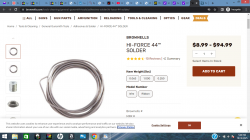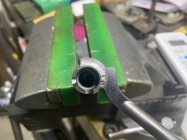I just removed one of mine off a mini. It was tough.. As I didn't want to save the factory barrel I put it in the lathe and cut a relief groove just in front of the receiver face.. Since I didn't have appropriate tools I put the action in my barrel vice then used a pipe wrench on the barrel.. It still popped when it broke loose.
Install the app
How to install the app on iOS
Follow along with the video below to see how to install our site as a web app on your home screen.
Note: This feature may not be available in some browsers.
You are using an out of date browser. It may not display this or other websites correctly.
You should upgrade or use an alternative browser.
You should upgrade or use an alternative browser.
Someone to remove howa mini barrel
- Thread starter Leadfarmer
- Start date
ELR LVR
Silver $$ Contributor
I use Copper for a barrel bushing - grips wellThe barrel vise and action wrenches that were "required" to be made ,, in the 1st semester, as students while in school. Not the flimsy tools I see advertised by some sellers. I looked and found no pics in this laptop of those tools. A heavy, 4 bolt barrel vise that uses metal bushings that fit the contour of the barrel (steel or aluminum, I have made some of Delrin, but they don't have the gripping power). First semester was machine tool tech. I already had 16yrs of 'job shop' machining experience before I enrolled. I already knew how to tool and set-up milling machines and lathes, and use a mill bastard file. Hard to describe the action wrench. Is a 'basic' that can still be used on others with adaptors. There were 40-50 required tools to be made, to the shop drawing provided, to pass that 1st semester. Yes, you were graded on the quality of your work. The school had some 'prints' of hand tools that Remington used in their factory, and made several of those. After all of these years, I still use 90% of them. The Luger receiver wrench I have only used once!
Last time I tried removing a factory Rem700 barrel
I applied heat
Started unscrewing and got it cracked off just a little bit
then thought it was going to come loose all the way so put my weight into it
The loctite resolidified as I got steady and ready and I dislocated my shoulder as the barrel would not budge again even after being cracked off slightly - shoulda used a cheater bar that time
Loctite, we have to take it into account and how it works - heat is required very often for loctite
I heat Rem triggers to soften the loctite on the adjustment screws, such as the X-Marks
it is a must or you risk stripping the head of the screw regardless of what proper tools one may have - and all without damage to the trigger assy, and a trigger is a much smaller piece of mass than an action and barrel which is a much larger heat sink that soaks up and distributes the heat away from the heat affected zone.
So if a trigger does not get damaged including not affecting the hardness of the sear surfaces......
...you get my point?
-------
Not gonna let a dislocated shoulder happen again - so while I understand your stance,
I'm gonna safely heat if need be
Some barrel are stubborn, I had a Steyr1900 that was this way, but instead of Gorilla forcing it with a 6 foot cheater - I worked at it slowly with heat and sharp raps with a big deadblow to the action wrench until it finally came loose
As a welder, I am privvy to using heat for many things, and the differences between Oxy/Acet and propane
usually propane alone does not get something hot enough to change the crystalline structure of the steel
Let alone you cant even Braze with propane which is why it is a pretty safe heat source
Normalizing things such a knife steels and tempering them to change the structure require heat soak times much longer than the minute or so an action will be heated up for.
Never had a problem yet on the actions - We're not getting the steel red or even glowing at all
Maybe your idea of a small propane torch is different than mine and some people mix oxygen into the mix, which would def be a No-No
Yet Propane by itself is also safe enough to heat things like aluminum without melting it
Is a safe method of also fitting two interference fit parts together such as bearing into a pocket
or removing bearings pressed onto a shaft
If propane got things too hot that method would not be used on bearings which their heat treat is much more important
A receiver having a Rockwell of approx 28c - already relatively soft
is not going to get softer from a minute or two of propane
BTW, as far as using propane - do you know how gunsmiths Silver solder a Rem700 bolt handle onto that piece of heat treated steel?
Maybe I should show you a video of how smoking hot that's done to as small of a mass as a bolt
Regards
John
Last edited:
WSnyder
Silver $$ Contributor
Perhaps you are speaking of brazing rather than soldering? Soldering typically is done at ~800˚F and less where brazing happens at ~800˚F and higher. Silver solder a Remington bolt handle on and it will likely come off shortly. Silver brazing is a more typical method. And I'm pretty sure Shortgrass knows the process welldo you know how gunsmiths Silver solder a Rem700 bolt handle
ELR LVR
Silver $$ Contributor
What is the name of the silvery filler stuff used for this process? (AKA: Filler Metal)Perhaps you are speaking of brazing rather than soldering? Soldering typically is done at ~800˚F and less where brazing happens at ~800˚F and higher. Silver solder a Remington bolt handle on and it will likely come off shortly. Silver brazing is a more typical method. And I'm pretty sure Shortgrass knows the process well

Attachments
WSnyder
Silver $$ Contributor
So high force silver solder. Use that and as I said that bolt handle just might be coming off sooner rather than later and you’ll get to do the job all over again for free. Silver braze material is the proper “filler metal” for the job.What is the name of the silvery filler stuff used for this process? (AKA: Filler Metal)
View attachment 1704048
Edd
Gold $$ Contributor
The stuff I use is called silver brazing alloy. Brand is Harris.What is the name of the silvery filler stuff used for this process? (AKA: Filler Metal)
View attachment 1704048
Last edited:
WSnyder
Silver $$ Contributor
Harris 45 is a common and popular one for brazing steel. It’s one of the newish cad free alloys. I still have a good supply of cadmium silver braze material. It flows much nicer than cad free but you have to deal with the fumes.The stuff I use is called silver brazing alloy. Brand is Harris.
Similar threads
- Replies
- 4
- Views
- 3,515
- Replies
- 26
- Views
- 6,800
Upgrades & Donations
This Forum's expenses are primarily paid by member contributions. You can upgrade your Forum membership in seconds. Gold and Silver members get unlimited FREE classifieds for one year. Gold members can upload custom avatars.

Click Upgrade Membership Button ABOVE to get Gold or Silver Status.
You can also donate any amount, large or small, with the button below. Include your Forum Name in the PayPal Notes field.
To DONATE by CHECK, or make a recurring donation, CLICK HERE to learn how.

Click Upgrade Membership Button ABOVE to get Gold or Silver Status.
You can also donate any amount, large or small, with the button below. Include your Forum Name in the PayPal Notes field.
To DONATE by CHECK, or make a recurring donation, CLICK HERE to learn how.











